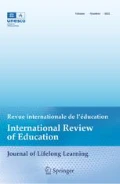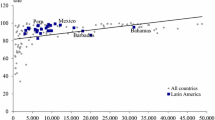Abstract
The paper reviews a number of educational policy statements of East African countries ranging from combining education with production at the primary level, to the financing of higher education. An assessment is made of how successful the policies have been in achieving their original intention. The paper's conclusion is that policy outcomes are far from matching expectations, mainly because of insufficient or no implementation. The reason most educational policies are not implemented is that they are vaguely stated and the financing implications are not always worked out. Another reason for failure is that the content of a policy is based on an empirically unsustained theoretical relationship between instruments and outcomes. The paper makes a plea for the formulation of more concrete, feasible and implementable policies based on documented cause-effect relationships.
Zusammenfassung
In dem Artikel werden eine Reihe von erziehungspolitischen Aussagen ostafrikanischer Länder untersucht. Sie reichen von der Verbindung der Erziehung mit der Produktion auf der Grundstufe bis hin zur Finanzierung der Hochschulausbildung. Es wird eine Bestandsaufnahme gemacht hinsichtlich des Erfolgs, der den erziehungspolitischen Programmen beim Erreichen ihrer ursprünglichen Ziele beschieden war, wobei man zu dem Schluß kommt, daß die Resultate der Programme hauptsächlich dadurch, daß diese nicht oder nur unzureichend durchgeführt wurden, weit davon entfernt sind, die Erwartungen zu erfüllen. Der Grund dafür, daß die meisten erziehungspolitischen Programme nicht durchgeführt werden, liegt darin, daß sie nur vage umrissen und die finanziellen Auswirkungen nicht immer ausgearbeitet sind. Ein weiterer Grund für ihr Fehlschlagen liegt darin, daß der Inhalt eines Programms auf einer empirisch unhaltbaren theoretischen Beziehung zwischen Mitteln und Resultaten basiert. In dem Artikel wird daher für die Formulierung konkreterer, geeigneterer und durchführbarerer Programme plädiert, die auf bereits belegten Beziehungen von Ursache und Wirkung beruhen.
Résumé
Le présent article examine quelques déclarations de pays de l'Afrique orientale relatives à la politique éducative, allant d'un système combiné d'éducation et de travail productif dans l'enseignement primaire, au financement de l'enseignement supérieur. Une analyse est effectuée pour savoir combien ces politiques ont réussi à mettre en oeuvre leur objectif premier. Cet article conclut que les résultats de ces politiques sont loin de répondre aux exigences, en raison essentiellement d'une mise en oeuvre insuffisante, voire nulle. La raison pour laquelle la plupart des politiques éducatives ne sont pas appliquées est due au fait qu'elles sont vaguement formulées et les implications financières rarement élaborées. La seconde raison de cet échec est que le contenu d'une politique se fonde sur une relation théorique entre instruments et résultats qui n'a pas été vérifiée empiriquement. Cet article plaide en faveur de politiques concrètes, réalisables et applicables fondées sur un rapport de cause à effet bien documenté.
Similar content being viewed by others
References
Achola, P.P.W. 1986. Educational Policies in Zambia: A Historical Account and a Critical Appraisal. Education and Training Department. The World Bank. (mimeo)
Bellew, R. 1986. African Education and Socioeconomic Indicators. World Bank Education and Training Department, Report No. EDT39.
Botswana Ministry of Education. 1984.Education through Partnership: Intermediate Schools of the Future. Gaborone.
Botswana Ministry of Finance and Development Planning. 1980.National Development Plan 1979–85. Gaborone.
Botswana Ministry of Finance and Development Planning. 1984.National Development Plan 1985–91. Gaborone.
Cooksey, B. 1986. Policy and Practice in Tanzanian Secondary Education Since 1967.International Journal of Educational Development 6(3): 183–202.
Craig, J.E. 1987. Implementing Educational Policies in Sub-Saharan Africa: A Review of the Literature. Educational and Training Department, The World Bank, Report No. EDT 79, May 1987.
Ergas, Z. 1982. Can Education be Used as Tool to Build a Socialist Society in Africa? The Tanzanian Case.Journal of Modern African Studies 20(4): 571–594.
Eshiwani, G. 1986. Educational Policies in Kenya: A Historical Account and a Critical Appraisal. Education and Training Department, The World Bank. (mimeo)
Ethiopia Government. 1979.The Workers' Party of Ethiopia: Programme. Addis Ababa.
Hinchliffe, K. 1985. Issues Related to Higher Education in Sub-Saharan Africa. Education and Training Department, The World Bank, Staff Working Paper No. 780.
Imbokodvo National Movement. 1972. Imbokodvo National Manifesto. Mbabane: Government of Swaziland.
Jolly, R. and Colclough, C. 1972. African Manpower Plans: An Evaluation.International Labor Review 106(2–3) (August–September 1972): 207–264.
Kenya Education Commission. 1964.Report of the National Commission on Education. Nairobi: Government Printer.
Kiros, F.G. 1986. Educational Policies in Ethiopia, 1941–1985: A Historical Account and a Critical Appraisal. Education and Training Department, The World Bank. (mimeo)
Lesotho Ministry of Education. 1975.Second Five Year Plan. Maseru: Government Printer.
Lulat, Y.G.M. 1982. Political Constraints on Educational Reform for Development: Lessons from an African Experience.Comparative Education Review 26(June): 235–253.
Magagula, C. 1986. Educational Policies in Swaziland: A Historical Account and a Critical Appraisal, Education and Training Department, The World Bank. (mimeo)
Maravanyika, O.E. 1986. Educational Policies in Zimbabwe: A Historical and a Critical Appraisal. Education and Training Department, The World Bank. (mimeo)
Morrison, D.R. 1976.Education and Politics in Africa: The Tanzanian Case. London: Hurst Co.
Narman, A. et al., 1984. What Happens to Kenyan Secondary School Students with Industrial Education: A Tracer Study One Year After the KCE-Exam 1983. University of Gothenburg. (mimeo)
Negarit Gazeta (Official Gazette) 10 (25 Nov. 1974). Addis Ababa: Government Printer.
Negarit Gazeta (Official Gazette) 13 (29 Sep. 1975). Addis Ababa: Government Printer.
Negarit Gazeta (Official Gazette) 29 (26 Aug. 1977). Addis Ababa: Government Printer.
Nyerere, J. 1967.Education for Self-Reliance. Dar-es-Salaam.
Odaet, C.F. 1986. Educational Policies in Uganda: A Historical Account and a Critical Appraisal. Education and Training Department, The World Bank. (mimeo)
Psacharopoulos, G. and W. Loxley. 1985.Diversified Secondary Education and Development: Evidence from Colombia and Tanzania. Baltimore, MD: Johns Hopkins University Press.
Tanzania Ministry of Education. 1980.Basic Facts about Education in Tanzania, Dar es Salaam.
Tanzania Ministry of Education. 1984.Educational System in Tanzania towards the Year 2000. Dar es Salaam.
Thelejani, T.S. 1986. Educational Policies in Lesotho: A Historical Account a Critical Appraisal. Education and Training Department, The World Bank. (mimeo)
Trudeau, E. 1964.Higher Education in Ethiopia. Montreal.
Uganda, Goverment of. 1981.Ten Year Development Plan 1981–1990. Kampala: Government Printer.
Uganda Education Commission. 1963.Report of the Uganda Education Commission. Kampala: Government Printer.
Unesco. 1961a.Final Report, Conference of African States on the Development of Education in Africa. Paris: Unesco.
Unesco. 1961b.Outline of a Plan for African Educational Development. Paris: Unesco.
Unesco. 1985.Statistical Yearbook. Paris: Unesco.
World Bank. 1986.Financing Education in Developing Countries: An Exploration of Policy Options. Washington, DC: The World Bank.
Zambia Ministry of Education. 1976.Education for Development: Draft Statement on Educational Reform. Lusaka: Government Printer.
Zambia Ministry of Education. 1977.Educational Reform: Proposals and Recommendations. Lusaka: Government Printer.
Rights and permissions
About this article
Cite this article
Psacharopoulos, G. Why educational reforms fail: A comparative analysis. Int Rev Educ 35, 179–195 (1989). https://doi.org/10.1007/BF00598437
Issue Date:
DOI: https://doi.org/10.1007/BF00598437




